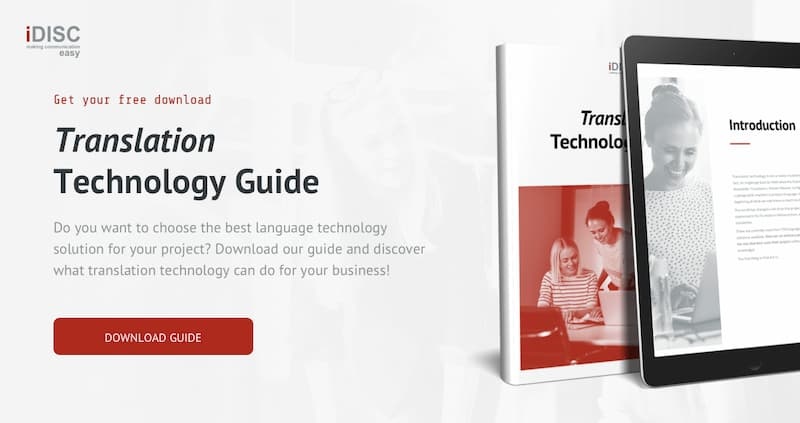Does your company need language services? Are you clear about your company's needs and the requirements to be met by a translation provider? Most companies feel lost when faced with these questions.
Depending on your needs, choosing the right translation service provider can be more complicated than you think.
Within the technical translation sector there are many different processes, tools and methodologies that serve different purposes and objectives.
Imagine that you need to present a technical report in another language to a client. Have you considered what type of translation service would be best for this piece of work?
The translation service that you choose will be the only link between your business and the target market or final user intended for your translated project.
Your brand image and desired message will also need to be adapted to the other language. By “adaptation” we mean a much broader concept than simply transferring the content of a text written in the source language to the equivalent terms in the target language.
A wide range of factors have to be considered and the key is to define your company’s needs and choose the language service provider that best understands and meets them.
In this article, we give you 5 key tips you need to know if you want to successfully choose a translation service provider.
Don’t miss out!
5 keys to choosing the right language service provider
Seek out qualified professionals
When it comes to translation services, it’s essential to use qualified, trained professionals with the necessary experience and knowledge to provide a high-quality service. It would not be strange to find amateurs on the web who believe they know how to translate for the simple fact of knowing more than one language, but can we consider someone a translator just because they know two languages?
The translation process should follow a methodology allowing for guidelines and certain quality standards to be set, otherwise it will be practically impossible to achieve the expected results.
One good way to ensure that the service will meet your needs is to request a portfolio of previously-completed translations. This will enable you to assess how your translation service provider works and the methodology that it uses, to check if it fits with your project.
Define the nature of your translation: do you need a specialized service?
Knowing what kind of translation you need is vital. When it comes to specialized or technical translation, it's very important for a translation service provider to be a technical translation expert.
On the other hand, if you need to translate an ecommerce website, your translator should understand coding language, know how to handle html files and be very creative, etc.
Without correctly identifying the nature of your texts to translate, you can’t determine the translation service that you need, and this can have a very negative impact on the goals that you wish to achieve.
Look for flexibility and good customer service
An essential consideration when looking for your translation service provider is to find out if these professionals have the ability to adapt to your needs at any given time.
Your chosen service should also be able to guarantee on-time delivery of all translation assignments. That’s why it’s important for your translation service provider to have the necessary resources to cope with your different demand flows.
In addition, good customer service undoubtedly adds value. A translation service provider should be able to give you the guidance that you need.
The importance of having native translators
According to different translation standards, translators should have a sound knowledge of the source language and an excellent command of the target language, which must be their mother tongue or native language.
As we mentioned above, speaking a language doesn’t just mean its knowing words; translators need a deep understanding of the sociocultural aspects that go along with them. A native-speaker translator, who lives in the target country, will know how to interpret communication and adapt it to the nuances of the local language, often involving regional expressions and sentiments. The more knowledge they have on this, the higher the quality of the translation.
Trust in technological innovation
These days, there are countless tools to help translators achieve the best results and optimize their time.
Translation technology is being perfected to make the translation process ever more efficient and affordable.
CAT (Computer-Aided Translation) tools and TMSs (Translation Management Systems), along with MT (Machine Translation)—increasingly using AI (Artificial Intelligence)—make it possible to rely less on human involvement when translating, although human translators do still need to intervene if we want a flawless result.
It no longer makes sense to choose a translation service provider that doesn’t use these technological tools.
We know that the sector, and the world in general, is evolving in this direction. Translation technologies are now a must for any language service provider wishing to keep up with market tools and trends. These tools allow translation professionals to speed up, perfect and simplify the translation process.
We hope that these tips help you to make the best decision for your business.
Here at iDISC, a translation agency, we meet all the requirements to be your ideal translation partner.
If you’re looking for a translation service provider that guarantees high quality, don’t hesitate to contact us. We will be happy to help you.





